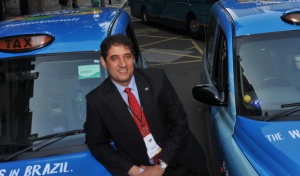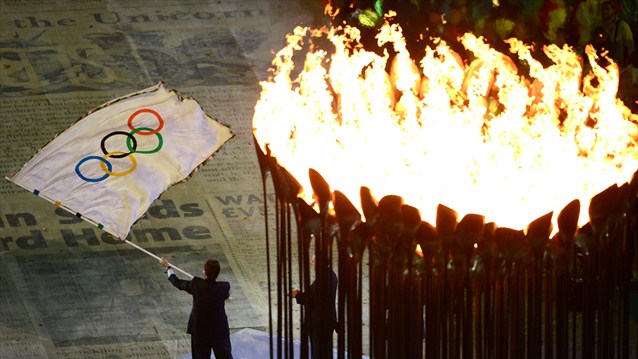Breaking Travel News interview: Embratur director of international markets, Marcelo Pedroso
 Marcelo Pedroso in London earlier
Marcelo Pedroso in London earlier With Rio de Janeiro taking over from London as the official Olympic Host City ahead of the 2016 Games and preparations well underway for the 2014 FIFA World Cup, Brazil is set to be at the forefront of international tourism over the next few years.
Here Breaking Travel News sits down with Embratur director of international markets, Marcelo Pedroso, to see how the destination is planning to utilise this unique double header to boost its position on the world stage.
Breaking Travel News: We were speaking to mayor of London Boris Johnson this morning, and he said he was relieved, in a way, the Olympics was over for London. The pressure was off, and is now shifting to Brazil. How does it feel from your side?
Marcelo Pedroso: We, in Brazil, are very excited. We could see at the Closing Ceremony how excited our people are, our athletes over here in London, those back in Brazil, there is a lot of support.
Brazil has taken possession of the Olympic flag today, it is arriving as we speak in Rio de Janeiro. This is a tremendous opportunity for us, to host the 2016 Olympic Games.
BTN: How advanced are your preparations for the Rio 2016 Games, and indeed the 2014 FIFA World Cup, which you are hosting across the country?
MP: We still have four years ahead, before the Games come to Brazil, but we are on track. We are on time to deliver.
We are preparing the infrastructure – in some places we are already finished. For example, the link to the south part of Rio is being built ahead of the Olympics and that is on schedule.
Over half, 56 per cent, of the venues are already built. They are being renewed as they were built for previous events, including the Pan-American Games in 2007.
A further 32 per cent of the venues are new – built from nothing. This includes the Olympic Park which we started building last July.
The final 12 per cent of the venues will be temporary infrastructure.
We are on time; we have enough time to prepare everything in Rio for the next Olympic Games.

Rio has taken over as the official Olympic Host City
BTN: Broadening out away from sport for a moment: how do you think Rio, and Brazil more generally is viewed over here in the UK? What can you do to enhance these perceptions?
MP: I think Rio, and indeed Brazil, has a very high profile here in the UK, and in Europe in a more general sense.
However, we now have an opportunity; with the media coverage we are generating, to broaden the image of the destination. We are looking to move beyond the idea the country is always summer and always football!
We like summer, we like football, we have great parties in Brazil, but there is much more than this.
Specifically, we have a huge diversity of nature and culture throughout Brazil. You can see hundreds of different landscapes, all the way from the Amazon, to the Pantanal, and, yes, to the beaches.
In terms of culture, we have a mixture of people who can present different gastronomy, different music, art, all across the country.
One of the main attractions is the people of Brazil, this really helps our brand. Our people are seen as friendly. We are a modern country, we have a developed infrastructure.
We have work to do, not just for the Olympics, not the World Cup, but for the whole of Brazil. What we are doing now will leave a real legacy for Brazil, not just for the tourists, but for the people of Brazil.
There is a lot of belief we can do this, during the Rio +20 event earlier this year, the vast majority said they felt Brazil would be ready for 2014, the World Cup.
BTN: Do you feel the World Cup will be more use with this agenda? People will be able to get out of Rio and see other parts of the country, which are perhaps undiscovered?
MP: Yes, they are completely different events. We have 12 cities for the World Cup: one in the north, four in the north-east, two in the central west, three in the south-west and two in the south.
In terms of tourists and their movement, spreading out across the country, the World Cup will be very useful.
But, the Olympics also has tremendous power. Due to its format, people can come for part of the Games and then head to different places in the country. It is down to us to showcase the country to visitors.
BTN: Who do you expect to be showcasing to? Who are you expecting to visit, not just for these events, but generally over the coming years?
MP: There will be a tremendous number of South Americas, especially for the World Cup, because South Americans are fans of football – they will be in Brazil.
For the Olympics also, this is the first South American Olympic Games so we will share with our friends in the region. But I expect the strong Olympic movement to draw guests from all over the world.
We hope to see the number of international tourists in Brazil increase from 5.4 million in 2011, all the way up to ten million in 2020
BTN: You have just launched a new advertising campaign – The World Meets in Brazil. Come Celebrate Life – to help with this process. Your president, Dilma Rousseff, was here in the UK to help with this at the start of London 2012. How has this been received so far?
MP: We launched here in the UK in July, but the rest of the world will be later this month. This is a global campaign, but here in the UK it has been well received.
This is just the first step of the plan however. We have a campaign, which we launched in 2009, which takes us all the way up to 2020. We have many steps to take in order to get there.
Now London has finished its Olympic Games, we can focus on this, on Rio. This is now our most intense visibility moment for us.
We hope to see the number of international tourists in Brazil increase from 5.4 million in 2011, all the way up to ten million in 2020. Revenue, we also hope to see increase from US$6.7 billion per year to US$15 billion.
BTN: What role do you think the Brazilian government will play in this? Do you at Embratur receive the support you need there?
MP: I feel the government, not only the federal government, but the state governments and municipalities are helping with both the World Cup and Olympic Games.
We have enough support. Of course we could always use more budget to invest in advertising, for example. We are investing US$40 million in this latest campaign, but we will have to wait and see the results.
Each level of government has responsibility for certain areas. The cities are taking care of their arrangements for the FIFA World Cup.
We are responsible for the promotion abroad, and we are doing everything we can there.
It is important to remember, the Olympics will take place in the winter season for us – this is an opportunity for us to show what else we can do in Brazil.
BTN: One final question, with the merger of TAM with LAN of Chile, do you feel travellers to Brazil will benefit?
MP: Yes, for us, the merger will create a huge number of connections. This is very important, especially in the domestic market.
More Brazilians are traveling in Brazil now, as well as overseas. This improves connections for tourists, more flights are possible.
There are 17.8 per cent more flights into Brazil than even two years ago – more Brazilians want to travel and this makes it easier for tourists.

